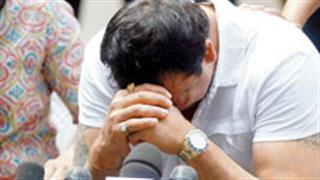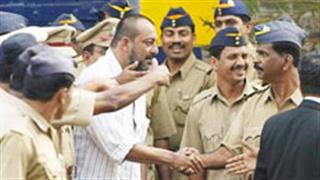Holding that it was not inclined to grant six months time as sought by Dutt to complete his pending film projects, the apex court bench of Justice P. Sathasivam and Justice B.S. Chauhan gave him four weeks to surrender, saying no further extension will be given.
"Considering the peculiar facts and circumstances and also various reasons stated in the application though we are not inclined to extend time as prayed for by the applicant... we extend further time to surrender by another four weeks from tomorrow, i.e., April 18, 2013... No further extension will be granted," the court order said.
It also recorded an assurance from senior counsel Harish Salve on behalf of Dutt that "no further petition will be moved in future".
At the outset of the hearing, the court told Salve: "You can't say that your client (Dutt) was unaware of his conviction and pending appeal before the Supreme Court."
The court said that "not only yourself (Dutt), all those who invested Rs.278 crore in Dutt's film projects, were they not aware that a judgment is reserved in the appeal by the Bollywood actor".
Salve told the court that he was not raising any legal ground and was seeking an extension of time to surrender purely on humanitarian grounds.

Appearing for the CBI, Additional Solicitor General Haren Raval opposed Dutt's plea for six months to complete his film projects before surrendering, saying that the same plea will be used as a precedent by other convicts for seeking enhancement of time to surrender.
"We will deal with every plea on a case-to-case basis," the court observed when Raval said that another petition seeking extension of time to surrender was listed for mentioning.
Raval said that a day earlier Tuesday, the court rejected the review petitions by the five convicts in the 1993 Mumbai bomb blast case.
At this, Salve said that those petitions were rejected on legal grounds seeking that they be permitted not to surrender till their clemency plea was decided.
Three convicts - Zaibunnisa Anwar Kazi, Ishaq Mohammed and Sharif Abdul - had invoked Article 21 contending that the court should defer their surrendering till their clemency plea was decided by the president.
Not accepting Raval's plea that Dutt's applications seeking more time to surrender amounted to the review of its judgment, the court asked him to "show any direct decision of the apex court where it has been said that after the court has given four weeks or six weeks time, the powers of the court comes to an end".
The apex court had pronounced its order March 21. While upholding Dutt's conviction under the Arms Act for possessing illegal arms, the court reduced his sentence from six to five years. The Terrorist and Disruptive Activities (Prevention) Act court had sentenced him to undergo six years' imprisonment.
Dutt has already completed one-and-half years in jail, and thus has to serve the remaining three-and-half years' sentence.




















